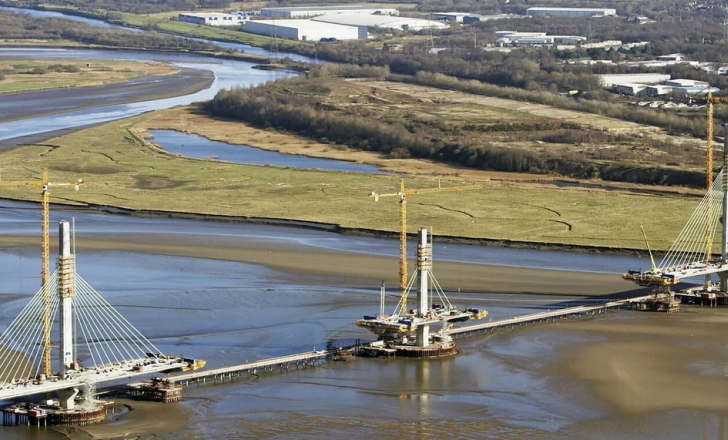
Emovis has extended its tolling contract for England’s 2.25km-long Mersey Gateway Crossing and the older 87m-long Silver Jubilee Bridge near Liverpool, between Runcorn and Widnes.
Emovis, a provider of toll-based mobility solutions and part of Spanish infrastructure group Abertis, has been working with the Halton Borough Council and the Mersey Gateway Crossings Board since 2017. The renewed deal runs up to 2029.
The Mersey Gateway Crossing, which crosses the River Mersey and the Manchester Ship Canal, includes a 1km-long cable supported section with its tallest pylon reaching 125m high. It was opened in October 2017 and built at a cost of around US$2.44 billion (€2.22 billion).
Meanwhile, the Silver Jubilee Bridge, down river from the Crossing, was opened in 1961 as a replacement for the Widnes-Runcorn Transporter Bridge. It was closed to vehicles for refurbishment upon the opening of the new Mersey Gateway Bridge in 2017, but reopened as a toll bridge in February 2021. The Jubilee is a listed structure, meaning it is protected from being demolished.
Emovis provides collection of tolls and charges for crossings both bridges through its merseyflow brand name. Almost 100 million crossings have been made across the two toll bridges since the Mersey Gateway opened in 2017, with on-time payment rates consistently in excess of 97% during this period, according to Emovis. Over 80% of journeys made across the bridges are now made by customers who have registered an account.
“To have over 80% of journeys being made by people who have chosen to register with merseyflow is great because it means these customers are all receiving discounts on their crossings,” said Mike Bennett, managing director of the Mersey Gateway Crossings Board which let the contract to Emovis. “It makes it much easier for them to pay and manage their accounts.”
Emovis operates globally and is currently operating some of the world’s most used barrier-free tolling infrastructures in the US, UK, Puerto Rico, Canada and Qatar. Abertis Mobility Services is the Abertis Group’s electronic solutions company dedicated to electronic tolling and free flow businesses through Emovis and Euroll, the firm’s payment systems operator.
In June 2019, the COWI-designed Mersey Gateway was awarded the Outstanding Structure Award for 2019, the highest distinction awarded by the International Association for Bridge and Structural Engineering (IABSE), based in Zurich, Switzerland.
Infrastructure group COWI led the Mersey Gateway Design Joint Venture – alongside AECOM, Fhecor and Eptisa, with architectural support by Dissing+Weitling - which was engaged by the Merseylink Civil Contractors to deliver the design of the scheme. COWI designed the bridge while AECOM led the design of the landside works, including 7km of new roads.
The main bridge deck is constructed from pre-stressed and reinforced concrete suspended from the pylons via high strength steel cable stays.
The decks of the approach viaducts were constructed using two 1,700-tonne, 157m-long self-propelled launching gantries - movable scaffolding systems - enabling rapid and safe construction of a complete 70m-long span in a single pour. On the cable-stayed bridge, six smaller gantries - form travellers - were used to cast the deck in 6m-long segments in a typical cycle of just five days.
Find out more about construction and history of the Mersey Gateway Project at www.merseygateway.co.uk.








